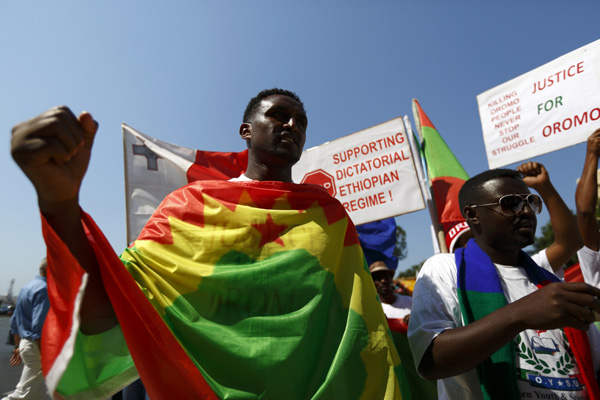The Centre for Human Rights, University of Pretoria, is deeply concerned by the ongoing human rights violations in Ethiopia following popular anti-government protests in the Amhara and Oromia regional states, as well as in the capital, Addis Ababa.
![]() Download this press statement in PDF
Download this press statement in PDF
The Centre is particularly dismayed by the use of force against protesters and the killing of civilians by the police, security and military forces during the protests. According to reports, nearly 100 people have been killed in the recent Amhara and Oromo protests, while more than 400 people have been killed during the earlier Oromo protests which began in November 2015.
The Centre is further concerned by the fact that the government of Ethiopia continues to suppress the human rights and fundamental freedoms of citizens including the rights to life, assembly, peaceful demonstration and the freedom of expression and association.
Considering the fact that Ethiopia is the seat of the African Union, and is regarded as a symbol of freedom against colonialism, the Ethiopian government is expected to have an exemplary human rights record to other African states. On the contrary, the government has been continually using force against peaceful protesters, which has often resulted in the death of a considerable number of people so far.
The Centre is particularly dismayed by the use of force against protesters and the killing of civilians by the police, security and military forces during the protests. According to reports, nearly 100 people have been killed in the recent Amhara and Oromo protests, while more than 400 people have been killed during the earlier Oromo protests which began in November 2015.
The Centre is further concerned by the fact that the government of Ethiopia continues to suppress the human rights and fundamental freedoms of citizens including the rights to life, assembly, peaceful demonstration and the freedom of expression and association.
Considering the fact that Ethiopia is the seat of the African Union, and is regarded as a symbol of freedom against colonialism, the Ethiopian government is expected to have an exemplary human rights record to other African states. On the contrary, the government has been continually using force against peaceful protesters, which has often resulted in the death of a considerable number of people so far.
This is particularly distressing as there have been no signs of holding the perpetrators accountable. The government has often brought charges against the leaders of protests—who are often demanding human rights—while the very persons who are responsible for the deaths and injuries of many people go scot free.
Although Prime Minister Haile-Mariam Desalegn has apologised for the loss of lives and the injuries sustained by protestors earlier this year, the government has not shown improvement in handling protests, and in holding perpetrators accountable. Instead, it continues to hold a firm stand against protesters as it is shown—again—when the Prime Minister threatened that ‘measures will be taken’ against protesters. The fact that government officials, alongside members of the security forces, are involved in these human rights violations highly hampers the quest for justice at the domestic level.
The Centre is further concerned that, despite these gross violations of human rights, there has been inadequate pressure from the African Union, international organisations and the ‘international community’ in general.
Therefore, the Centre calls upon the African Union and the international community to take steps to ensure that the Ethiopian government produces tangible results with regards to its human rights record.
In particular, the Centre calls upon:
- The African Commission on Human and Peoples’ Rights to condemn the human rights violations in the country; to undertake an urgent visit to the country, and to report the human rights situation in the country to the African Union Assembly;
- The Government of South Africa to condemn the serious human rights violation by the Ethiopian government, and work together with other African states towards a common AU position and action towards this issue.
The Centre also calls upon the Government of Ethiopia:
- To immediately stop violence against, and the killing of protesters, as well as to respect and protect the human rights and fundamental freedoms of the people, including the right to life, the right to peaceful assembly, the right to freedom of expression, the right not to be tortured, and the freedom from arbitrary arrest and detention;
- To take precautionary measures to prevent the use of force during peaceful assembly;
- To address all the issues raised by the people, in a democratic manner, according to the Ethiopian Constitution and the human rights treaties to which Ethiopia is a party;
- To note that the right to peaceful assembly and peaceful demonstration should not be impeded by arbitrary restrictions in the pretext of protecting law and order;
- To bring to justice government officials and members of security forces, who are responsible for the attack and killings as well as to provide adequate remedy for people whose properties have been destroyed and looted during the protests, and;
- To promptly establish an independent and impartial commission of inquiry to investigate, report, and where required, to prosecute perpetrators.
For more information, please contact:
Prof Frans Viljoen
Director, Centre for Human Rights, University of Pretoria
Tel: +27 (0) 12 420 3228 / 3810
Mobile: +27 (0) 73 393 4181
Email: frans.viljoen@up.ac.za


